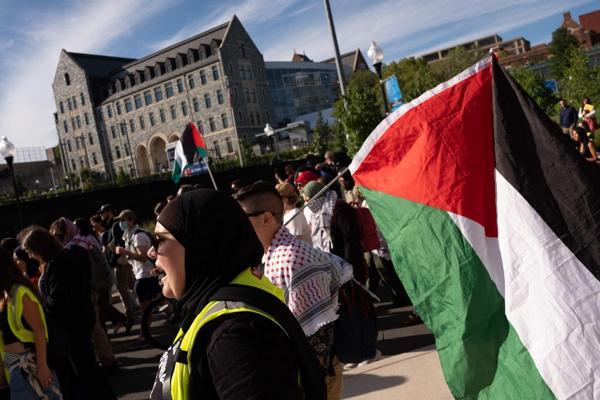US universities tighten security to curb Gaza protests
ISTANBUL


Following pro-Palestinian protests that spread from U.S. universities this spring to campuses worldwide, U.S. schools are tightening security ahead of the start of fall classes, including a ban on protest camps.
Thousands of students across the country protested their universities' financial support for companies that support Israel's attacks in Gaza, camping out on campuses despite police intervention.
These demonstrations, which lasted from around April until graduation in June, prompted university administrators to address concerns about future protests.
New York’s Columbia University, where the pro-Gaza protests got their initial spark, has fenced off the lawns where student camps were previously established.
In a July email to students, the administration announced plans to introduce a color-coded campus system, restricting access to campus activities.
In addition, the university is reportedly considering bringing in peace officers with arrest powers to bolster its existing security force of 290 personnel.
New measures at the University of Virginia include banning outdoor events between the overnight hours of 2 to 6 a.m.
The administration has also ruled that no tents may remain on campus for more than 18 hours and sleeping on campus grounds between midnight and 6 a.m. is now prohibited.
Students wearing masks on campus must provide identification upon request by university officials.
The University of Pennsylvania has prohibited camping and nighttime protests, citing student and staff safety.
Demonstrations in university offices, libraries and museums are also banned.
At Ohio’s Case Western Reserve University, protests exceeding 20 participants or lasting more than two hours now require written permission from the administration.
However, the American Association of University Professors (AAUP) condemned such measures, saying they infringe on free speech and discourage students and faculty from participating in peaceful protests.
The group criticized university administrations for imposing these restrictions without consulting faculty members.
Israeli attacks have killed more than 40,800 people in Gaza, according to the Hamas-run territory's Health Ministry.
Amnesty International yesterday urged a war crimes probe into Israel razing homes and farms in eastern Gaza to expand a so-called buffer zone between it and the Palestinian territory.
"Using bulldozers and manually laid explosives, the Israeli military has unlawfully destroyed agricultural land and civilian buildings, razing entire neighborhoods, including homes, schools and mosques," it said.
The London-based rights group said the levelling since the start of the war last October "should be investigated as war crimes of wanton destruction and of collective punishment.”
